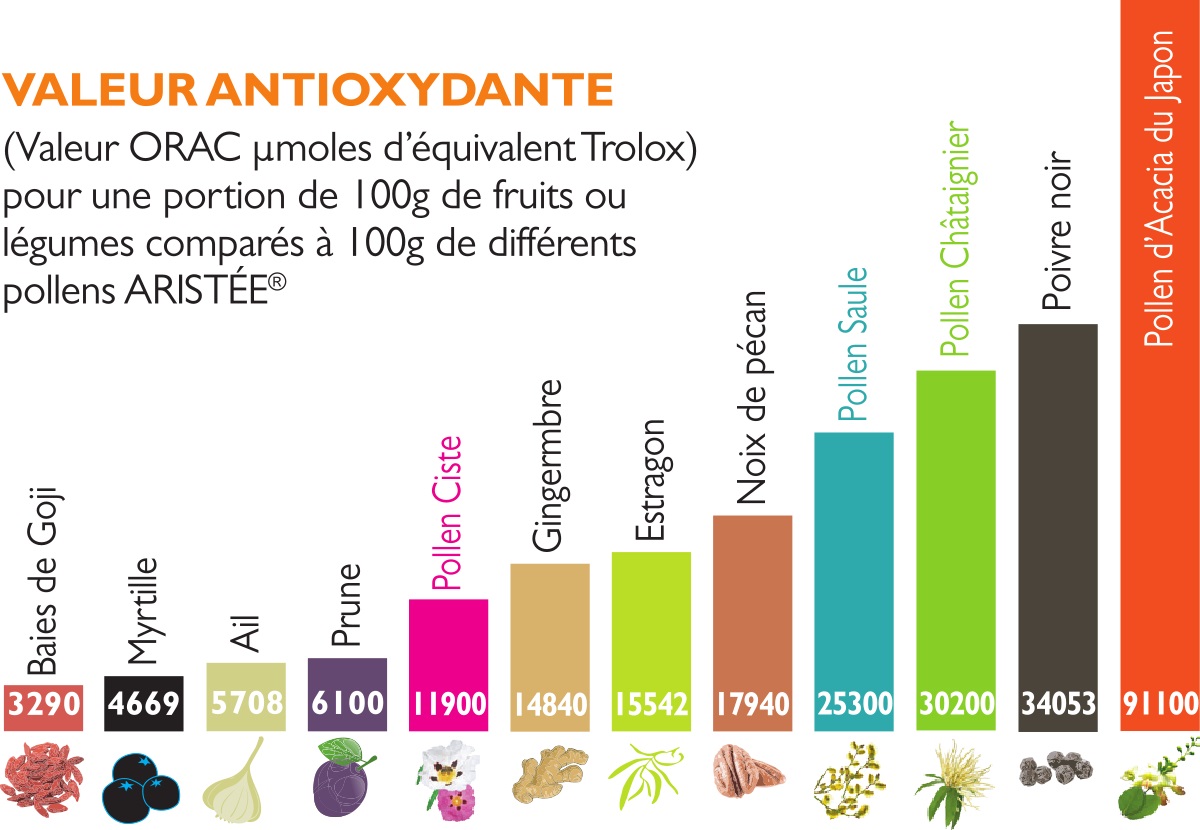What makes our pollens different?POLLEN: A FOOD PRODUCED BY PLANTS AND ENRICHED BY BEESWhen bees forage, they gather pollen from the stamens of plants and flowers. They form what are called pollen loads to which they add lactic acid bacteria (Lactobacillus and Bifidobacterium), and place them in the baskets located on their hind legs. As pollinators bees contribute to 70% of plant biodiversity. As they return to the hive they fly through pollen grids or traps. Each time, they drop a few pollen loads which fall into a drawer. Harvested by apiarists on a regular basis, the pollen is then immediately frozen. It is then analyzed, controlled and packaged by Pollenergie, on their production site located in Saint-Hilaire-de-Lusignan in South-West France. Bee pollen is traditionally sold in organic or bulk food stores. Often, it is dried by heated ventilation after being harvested, which removes almost all of its water content; it can then be preserved for long periods of time at ambient temperatures. However, the downside of this conservation method is that pollen loses a very large part of its nutritional qualities during the drying process. WHY DO WE FREEZE THE BEE POLLEN?Pollen is a live, raw, complete and complex food. When consumed regularly, along with a balanced diet, it contributes to intestinal wellbeing and comfort, and overall health. But these little nuggets of health quickly deteriorate when in contact with air and ambient temperatures. When pollen is heat-dried, many of its micronutrients will be destroyed due to heat-sensitivity. Our studies have evaluated the impact of different conservation methods (fresh frozen, dried at 5°C, dried at 40°C, freeze-dried) as well as the effects of the aging process on the lactic flora of pollens collected by bees. These studies have found that freezing pollens in their fresh state is the most effective method of conservation to preserve the pollens’ lactic flora. Fresh freezing protects all of the micronutrients such as carotenoids, from heat and desiccation.  Pollenergie’s patented conservation method consists in freezing the pollen immediately after harvest, before being packaged in water-tight, vacuum-packed and nitrogen-sealed containers. Nitrogen, which is a neutral gas, increases the storage life of fresh foods. This enables pollen to safely travel in ambient temperatures for over 7 days before needing to be stored back in a freezer. Pollens retain their organoleptic properties as well as their nutritional value. Learn more about our shipping methods. NUTRITIONAL CHARACTERISTICS OF FRESH POLLENThe work specifications our partner apiarists abide by allow us to guarantee the monofloral origin of our pollens and ensure they are free of any hive residues. Our pollens are harvested either from wilderness areas or from zones which are certified organic. Harvesting is done during times of the year when specific botanical species are in bloom.
It is well documented that pollens gathered by bees have properties which are extremely beneficial to our health. Without drilling down on every nutritional element of each pollen, here is what they are mainly composed of: 15% to 22% protein, which is higher than eggs and equivalent to some types of meat; 4% to 6% lipids, up to 50% of which are polyunsaturated fats; 50% to 60% carbohydrates; 10% to 14% fiber (100 g of pollen provide 50% of the Recommended Daily Value); a large quantity of bee-specific lactic acid bacteria (Lactobacillus and Bifidobacterium); a high concentration of vitamins (100 g can cover up to 100% the RDV of vitamins B9, C and E); like all plants, fresh pollen are rich in minerals and trace elements (calcium, iron, magnesium, phosphorus) and offer a very favorable sodium-to-potassium ratio; they also contain high amounts of antioxidant microconstituents (carotenoids and polyphenols) as evidenced by ORAC values up to 10 times higher than those of fruits and vegetables; and over 80 enzymes were identified in pollens that did not undergo a drying process. ACTION OF FRESH POLLENSWhen kept fresh, pollen is a complete food. Paired with a balanced diet, it prevents and/or contributes to compensate for micronutrient deficiencies. Raw pollen also helps fight against the occurrence of certain pathologies. Regularly consuming pollen which has been frozen in its fresh state encourages proper organ functions. While there are notable differences in the nutritional value of pollens from different floral origins, they all have some properties in common. Thanks to high concentrations of plant-based proteins, fiber, vitamins, minerals and trace elements, fresh pollen helps fight against fatigue, revitalizes our body and improves our natural defenses.
Raw pollens contain 15 to 35% protein depending on their botanical origins. This is higher than any other plant-based source and higher even than some animal products, such as eggs. The quality of these proteins is excellent, containing important levels of essential amino acids: they stimulate protein synthesis, modulate inflammation, improve intestinal mucosa, etc.
Fresh frozen pollens contain lactic acid bacteria which, when associated with fiber, help to replenish a healthy intestinal flora. This in turn promotes better absorption of the macro and micronutrients contained in our diet.
Pollen is rich in fiber, mainly insoluble, containing close to 50% of the Recommended Daily Value (RDV). It is well documented that dietary fiber plays an important role in the proper functioning of our intestinal system. And, only fresh pollen contains a large amount of bee-specific lactic acid bacteria, also known to improve the intestinal flora (probiotic effect).
Our intestinal mucosa alone is responsible for 60 to 70% of our immune system, and fights against pathogens transported by the foods we eat. Therefore, by improving our digestive system we improve our overall natural defenses. By rebalancing and strengthening our intestinal flora, fresh frozen pollen promotes the normal functioning of our immune system.
Fresh pollens offer an excellent sodium-to-potassium ratio (between 14 and 18). This particular property means they have a strong alkalizing action on the body which proves very effective against demineralization. Bee pollens also contain phytosterols, molecules largely known and used to limit the absorption of cholesterol and fight against high cholesterol, a risk factor for cardiovascular disease.
One theory surrounding the causes of cellular aging is the excessive amount of free radicals in the body which alter macro elements likes proteins, lipids and DNA, and contribute to their dysregulation. With age, the production of free radicals increases and conversely our antioxidant defenses weaken.
Pollens, especially fresh ones, are rich in vitamins and other antioxidant molecules, minerals and trace elements (vitamins C and E, polyphenols and carotenoids). They rank the highest within the plant kingdom in terms of their antioxidant power. For example, chestnut pollen has an antioxidant power that is 10 times superior to grapes!
 HOW TO PRESERVE FRESH POLLEN?As soon as you receive your product, place the container of pollen directly into the freezer or ice box. For the first use open the container and take one teaspoon to one tablespoon of pollen for immediate consumption. The rest of the container should then immediately go back into the freezer. Fresh pollen contains very little water. So even when frozen, the pollen loads won’t stick to one another. You can also put three tablespoons of pollen into a non air-tight bowl and keep it in the refrigerator. This is a three-day portion at a rate of one tablespoon per day taken in the morning, You can repeat this step every three days for the next three days’ worth of daily portions, and so on.
This process preserves all of the nutritional properties of the pollen from the first spoonful to the last. A 250 g container will last 3 weeks.
Good to know: thanks to our innovative conservation method, the pollen can be frozen and thawed several times without any risk of deterioration, as long as the container has not been opened. POLLENERGIE’S PROMISEFresh pollens that are naturally gluten-free, and contain no additives or preservatives. Guaranteed freshness and concentration of active ingredients for health and wellness. Recognized scientific research and innovative processes which guarantee the integrity of all active ingredients contained in Aristée® products. Over 20 years of expertise promoting responsible apiculture and respect for the surrounding biodiversity. Rigorous phytosanitary, microbiological, nutritional and organoleptic analyses for guaranteed quality. Certification and designation labels of responsible production: Organic certification, “Wildflower” designation, V-Label, Imprim’Vert, Fabrication Française (French production). |
